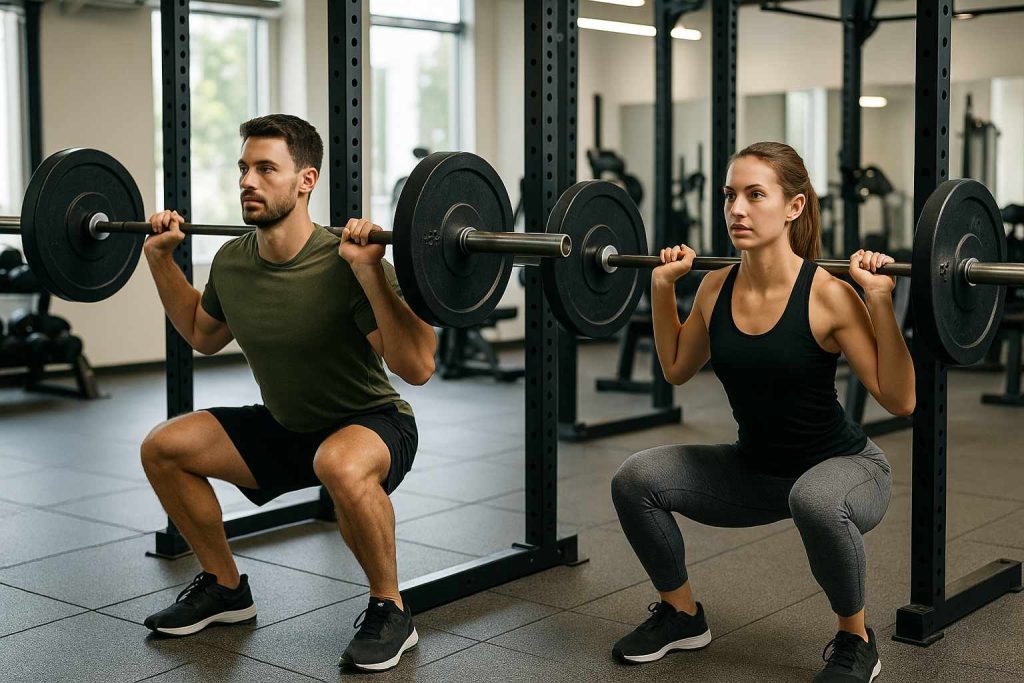Yes, you can squat every day for impressive leg strength and size gains—but it’s not the best approach for everyone, and the benefits depend on your experience, programming, and recovery.
If you want massive leg gains, high-frequency squatting can be effective, but smart programming and careful attention to recovery are essential to avoid injury and overtraining.

Understanding whether you should squat daily is crucial for safe and optimal progress. In this guide, you’ll learn the benefits, risks, best practices, and the latest research so you can decide if daily squats are right for your goals.
What Is Daily Squatting?
Daily squatting (sometimes called “squat every day” or “high-frequency squatting”) means performing squats—usually with a barbell—every single day, often varying intensity and volume.
This strategy has been made popular by strength athletes, Olympic weightlifters, and bodybuilders aiming for faster progress.
- Typical Programs: Smolov, Bulgarian Method, daily maxing, and other variations.
- Purpose: Increase training frequency for improved technique, neural adaptation, and more training volume.
- Key Fact: A 2024 meta-analysis in the Journal of Strength and Conditioning Research showed that high-frequency squat training can significantly improve strength for experienced lifters (source).
Benefits: What Happens If You Squat Every Day?
1. Rapid Strength Gains
- Neural Adaptation: Daily practice improves movement efficiency and power.
- Higher Weekly Volume: Frequent sessions allow you to accumulate more squatting volume, leading to faster progress for advanced lifters.
- Short-Term Results: Programs like the Smolov routine have reported increases of 22–58 kg (48–128 lbs) in back squat max in as little as 13 weeks (Wikipedia).
2. Improved Technique & Consistency
- Skill Mastery: Practicing squats daily helps refine form, making each rep more effective and reducing injury risk.
- Olympic Lifters’ Secret: Many elite athletes use near-daily squatting to maintain and perfect their movement patterns (BarBend).
3. Increased Motivation & Training Discipline
- Habit Formation: Daily training helps build routine and discipline, making it easier to stick with your fitness plan.
Risks & Drawbacks of Squatting Every Day
1. Overuse Injuries & Burnout
- Joint Stress: Daily heavy squats put enormous pressure on knees, hips, and lower back.
- Chronic Fatigue: Without adequate recovery, you risk central nervous system (CNS) fatigue, soreness, or even injuries (Stronger By Science).
- Reduced Performance: Over time, your performance may decline if you neglect rest and recovery.
2. Plateaus in Muscle Growth
- No Extra Gains After a Point: Research shows muscle growth (hypertrophy) plateaus when frequency exceeds 2–3 sessions/week, provided weekly volume is equalized (Stronger By Science).
- Beginners Beware: High-frequency squatting is not recommended for beginners. Most will see similar or better results with 2–3 high-quality squat workouts per week.
3. Neglecting Other Muscle Groups
- Imbalanced Training: Focusing solely on squats can mean neglecting other important lifts, leading to muscular imbalances and weaker overall progress.
What Does the Latest Science Say?
- High Frequency Works for Strength: A 2024 study found that frequent squatting improves strength faster in trained lifters but doesn’t significantly boost muscle mass beyond 2–3 times a week (NSCA, 2024).
- Recovery Matters Most: The American College of Sports Medicine still recommends 48–72 hours of recovery between heavy strength sessions for most people (ACSM Guidelines PDF).
- Technique & Volume > Frequency: Quality reps and weekly volume matter more than training every day (BarBend).
- AI-Based Recovery Apps: In 2025, new apps and wearables monitor fatigue and optimize frequency, making daily squatting safer for some but still not recommended for everyone.
Who Should Try Squatting Every Day?
Best Candidates
- Advanced Lifters: With solid form, experience, and great recovery habits.
- Strength Athletes: Preparing for a meet or needing rapid short-term gains.
- Motivated, Injury-Free Individuals: Who can listen to their body and adjust as needed.
Who Should Avoid It?
- Beginners & Intermediates: Focus on learning good form and allowing time to recover.
- Anyone With Existing Injuries: Or chronic pain, joint, or back issues.
How to Squat Every Day Safely (If You Choose To)
If you’re determined to try high-frequency squatting, follow these proven guidelines:
- Vary Intensity: Mix heavy, moderate, and light days (e.g., 80% of max one day, 60% the next).
- Watch Your Volume: Focus on total weekly sets/reps, not just daily numbers.
- Track Recovery: Use apps or listen to your body. Stop if pain or persistent fatigue occurs.
- Include Mobility & Assistance Work: Maintain joint health with stretching and strengthen supporting muscles.
- Cycle Frequency: Try daily squats for 4–8 weeks, then reduce frequency to allow recovery.
- Consult Experts: Work with a coach or physical therapist for best results.
Frequently Asked Questions
Q: Will I get bigger legs if I squat every day?
A: You might see rapid strength gains and some muscle growth, but research shows similar hypertrophy is achievable with less frequent, quality sessions if your total weekly volume is matched (Stronger By Science).
Q: Is squatting every day bad for your knees?
A: Not if you use perfect form, moderate loads, and recover well. But poor technique or excessive volume raises risk of injury (BarBend).
Q: What’s better—more weight or more frequency?
A: Progressive overload (more weight, sets, or reps over time) is key. Frequency is just one tool; overdoing it can backfire.
Key Takeaways: Should You Squat Every Day for Massive Leg Gains?
- Yes, you can squat every day, but you don’t have to.
- Massive leg gains come from smart programming, progressive overload, and good recovery—not just frequency.
- Most lifters see best results squatting 2–3 times per week with high-quality, challenging sets.
For official recommendations, see
NSCA Squat Technique & Applications and
ACSM Resistance Training Guidelines (PDF).
Conclusion
In summary: Squatting every day can build strength and size, especially for advanced lifters—but for most people, it’s not necessary for massive leg gains. Prioritize smart programming, quality reps, and recovery for best results.
